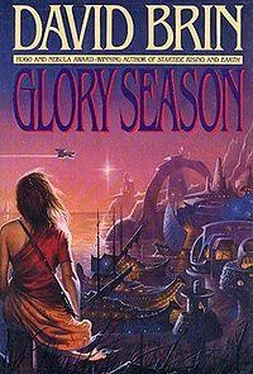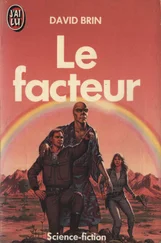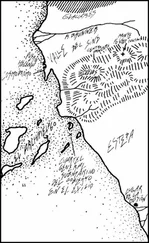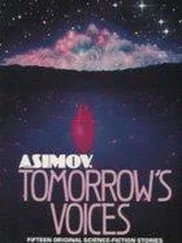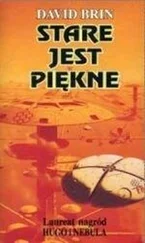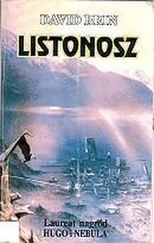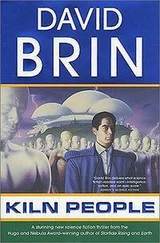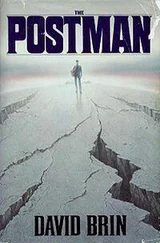“ ‘The three rail-clans operate competing freight lines, each in partnership with a male guild, with shared ownership of capital approved by an act of the Planetary Council in the year…’ ”
A surprisingly close working relationship between the sexes, Maia pondered. Yet, hadn’t Lamatia Hold once welcomed the same ships and sailors, year after year? Those flying the Pinniped banner? Preserving for them rights of all kinds, ranging from commerce to procreation? Who was she to say what was normal, and what aberration?
Perhaps the heretic in Lanargh is right. These may all be signs of changing times.
The solar-electric locomotive sped along, faster than the swiftest horse or sailing ship. At each stop, out swarmed Rail Runner maintenance boys, toting tools and lubricants, and Musseli girls armed with clipboards and crate hooks, hurrying to service the machines and expedite cargo under the scrutiny of older supervisors. Maia had noticed that many of the orange-clad males bore faces strikingly similar to the female clones in maroon overalls.
Imagine, sisters continuing to know their own brothers, and mothers their sons, long after life has turned them into men. Maia could think of several drawbacks and advantages to such a close relationship. She recalled sweet little Albert, whom she had tutored for a life at sea, and thought how nice it might have been to see how he grew up. The stray thought reminded her of those childish dreams of someday finding her own father. As if happenstance of sperm and egg meant anything in a big, hard world.
A world capable of snapping stronger bonds than those.
Stop it. Maia shook her head vigorously. Let go of the pain. Leie would.
After reading silently for a while, Tizbe looked up from her gunnysack chaise. “Oh, this part’s lovely, Maia. It says, ‘Long Valley retains many quaint features of a frontier region. From your stateroom, be sure to observe the rustic little towns, each with its monotone grain silo and banks of solar cells…’ ”
There was that word quaint again. It seemed to refer patronizingly to anything simple or backward, from the viewpoint of a city-bred tourist. I wonder if Tizbe finds me quaint, too.
“ ‘…between the towns and zones of cultivation, note stretches of native kuourn grass, set aside under ecological rules even stricter than decreed by Caria City…’ ”
They had seen many such oases—great lakes of waving stalks with purple flowers. The Perkinite cult governing this valley worshiped a Stratos Mother whose wrath toward planet abuse was matched only by her distrust of the male gender. Yet, Maia felt sure much of the plains was off-limits for another reason—to prevent competition.
When Long Valley first opened for settlement, young vars must have swarmed in from all over Stratos, forming partnerships to tame the land. Affiliations that became powerful, interclan alliances when successful women settled down to raise daughters and cash crops. That, in turn, meant pitching in to build a railroad, to export surplus and import supplies, comforts.
And men. Despite their slogans, the Perkinite Utopia soon began to resemble the rest of Stratos. You can’t fight biology. Only push at the rules, here and there.
“Oh! Here’s a good part, Maia. Did you know there are more than forty-seven local species of zahu? It’s used for all sorts of things. Like—”
A shrill whistle thankfully interrupted Tizbe’s next eager recounting. It was the ten-minute warning before their next stop. Maia glanced at the wall chart. “Clay Town comin’ up.”
“So soon?” asked the hitcher. Maia threw open her ledger, running a fingertip along today’s bills of lading. “Can’t you hear the whistle blowing? Come on, you read numbers, I’ll fetch boxes.”
She kept her finger by the starting place until Tizbe sauntered over. Then Maia hurried to the single aisle running the length of the car, between tall racks of shelving. “What’s the first number?” she called.
There followed a long pause. “Um. Is it 4176?”
Maia winced. That had been the final entry at their last stop, only an hour ago. “Next one! Start where it says Clay Town on the left.”
“Oh! You mean 5396?”
“Right!” Grabbing a block and tackle that hung from an overhead rail, Maia scanned the shelves. She found the correct box, hooked its leather strap, pulled the chain taut, and swung the package out, hauling it along the track to where she could lower it gently by the door. “Next.”
“That would be … mm, let’s see… 6178?”
Maia sighed and went looking. Fortunately, the awkward Musseli sorting system wasn’t too hard to puzzle out, although it might have been meant to confuse as much as to clarify. “Next?”
“Already? I lost my place. … Ah! Is it 9254?”
Strictly speaking, it should have been Maia at the ledger and her assistant doing the hauling. But Tizbe had whined about having to do work “suited for lugars and men.” She couldn’t get the gliding winch to work. She picked up a sliver. Maia had a theory about this creature. Tizbe must be a var-child from some big-city clan, so rich and decadent they pampered even their summerlings, kissing them on the brow and sending them off unequipped to survive past their first year. Perhaps Tizbe expected to live off appearance and charm alone.
I wonder why she looks familiar, though.
Despite, or maybe because of, Tizbe’s assistance, the pile by the door wasn’t quite finished by the time the second whistle blew. The locomotive’s flywheel audibly changed tone as the train began braking. Maia hurried the pace. Her hands had callused from hard work, yet the rough chain bit her fingers whenever the car jostled. The last, heavy package almost got away, but she managed to lower it down with just an echoing thump.
Short of breath, Maia rolled open the sliding door as rows of towering kilns and brick ovens grew like termite mounds around the train, enveloping it in an aroma of glazed, baked earth. “Welcome to Clay Town, hub of Argil County,” Tizbe sang with false enthusiasm. For a while, everything was red or dun-colored. Stacks and crates of ceramics swam past in a blur.
Abruptly, the aromatic kiln district gave way to residences, row after row of petite houses. Here in Long Valley, important matriarchies built their citadels near their fields or pastures, leaving towns to small homesteads, sometimes derisively called microholds. From the decelerating train, Maia watched a woman stroll by, holding the hand of a little girl who was obviously her clone-daughter. Half the population of the valley apparently lived this way—single women, winter-born but living varlike existences, with jobs that barely paid the bills and let them raise one winter child, exactly the way their mothers had, and grandmothers, and so on. One identical next-self to inherit and carry on. A thin but continuing chain.
It seemed a simpler, less presumptuous sort of immortality than the binge-or-bust cycles of great houses. You could do worse, Maia thought. In fact, there seemed something terribly sweet and intimate about the solitary mother, walking alone with her child. Ever since her own grand dreams shattered, Maia had begun thinking in more modest terms. The Musseli were beneficent toward their employees, treating several score singleton women almost like full members of their commune. Perhaps, if she worked hard at this job, Maia might win a long-term contract. Then, after saving up to build a house…
Even after all that, there remained the problem of men. Or a man. You had to start off with a winter birth. It was rare to be able to conceive any other time of year, till you’d had a clone. But getting pregnant in winter wasn’t as simple as going into the street and calling, “Hey, you!”
Читать дальше
